Throw a thieving gull into the mix and things get complicated.
Five days ago at Bear River MBR I photographed several Western Grebes, both adults and chicks, having a very hard time holding on to the slippery fish they’d caught or were about to be fed. I wanted to document two of those incidents in a blog post but there were too many photos involved for a single post so I divided them up into two parts. I published Part I two days ago.
This is Part 2.
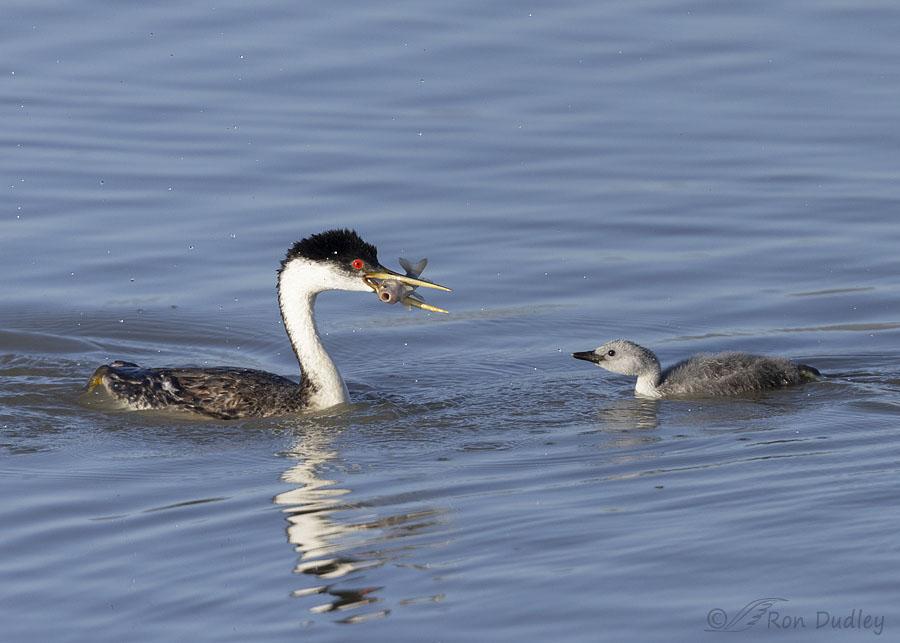
This adult Western Grebe is the male (I believe) of a mated pair that had three half-grown and very demanding chicks that they were trying to keep fat and happy. All three chicks were in the water rather than being back-brooded while I was with them. They’re really getting too big for back-brooding but they can be hard to convince of that.
Here he’s about to deliver a fairly large fish to one of the hungry youngsters. The tiny flying water droplets you may have noticed were a result of him shaking the fish. I think.
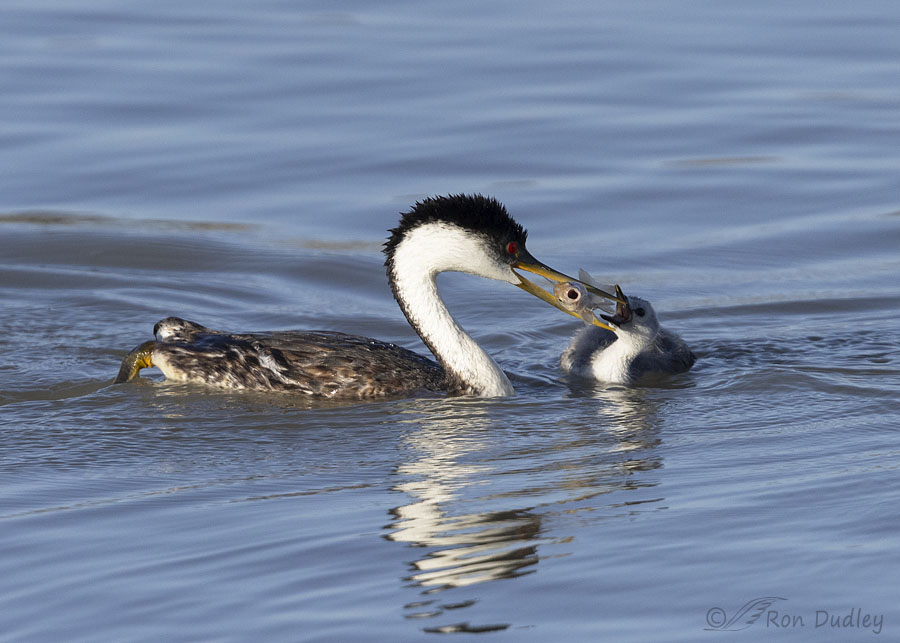
At first the fish exchange seemed to go swimmingly.
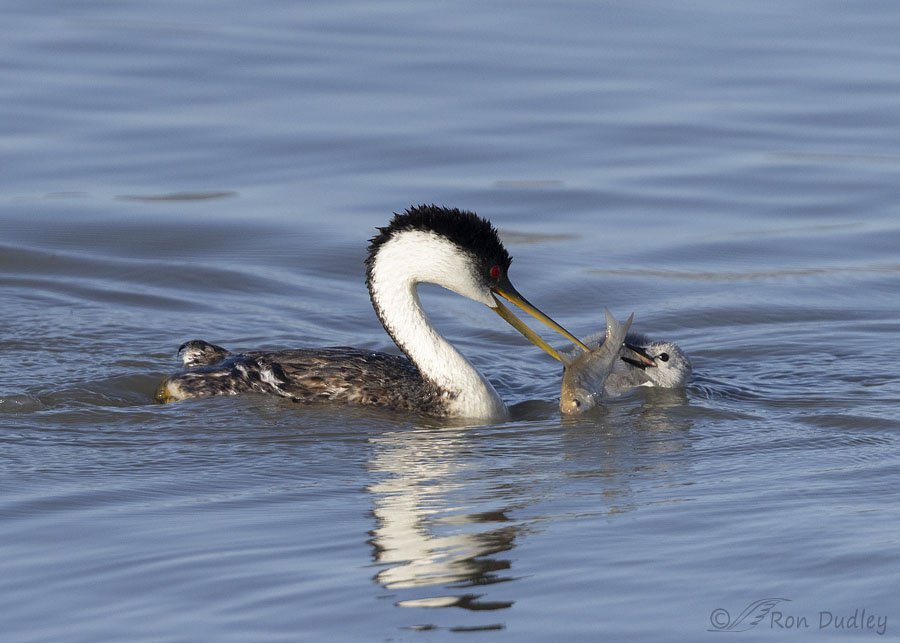
But two frames later somebody dropped the ball.
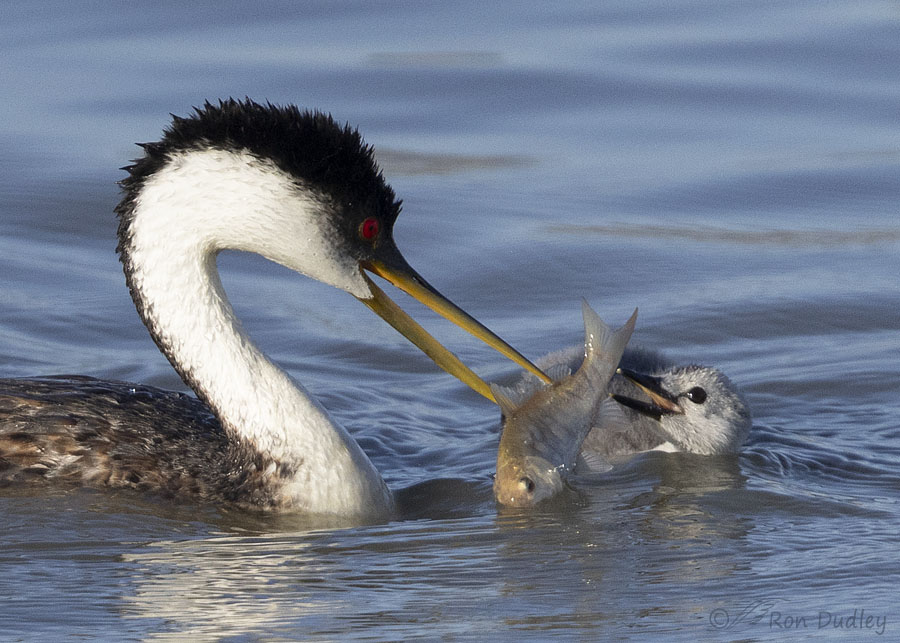
In this enlargement of the previous image it appears that the adult male released the fish before Junior had a firm grasp on it, so the fish is falling into the water.
If I were the umpire of this game I’d charge Dad with an unforced error.
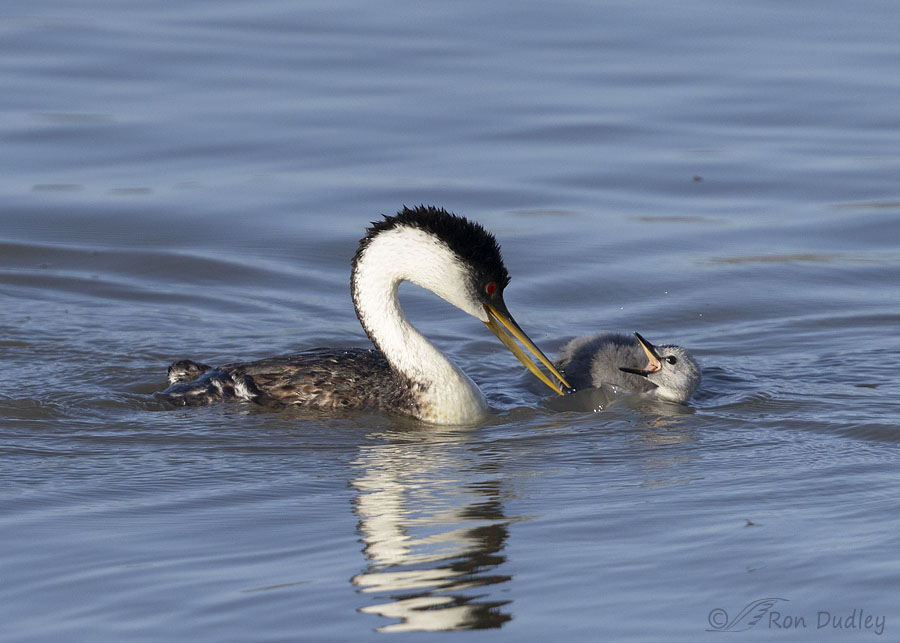
The fish immediately went under the surface so…
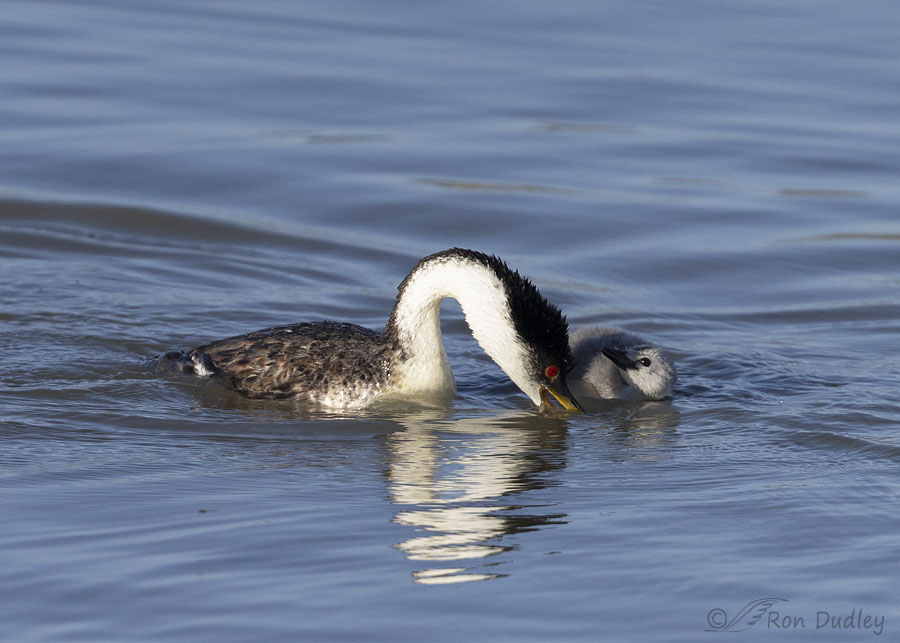
Dad tried to retrieve it.
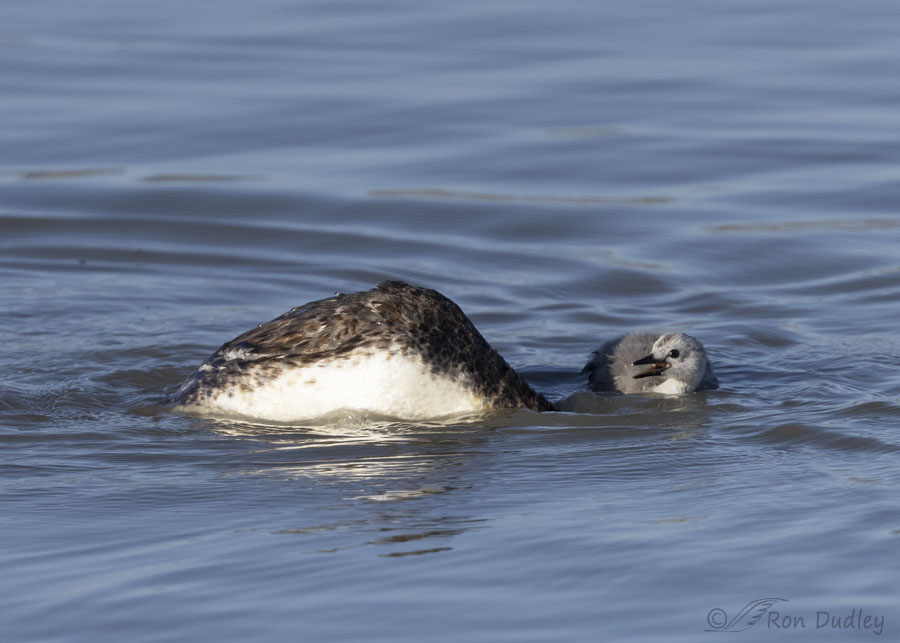
He really went after that fish but a few frames later he…
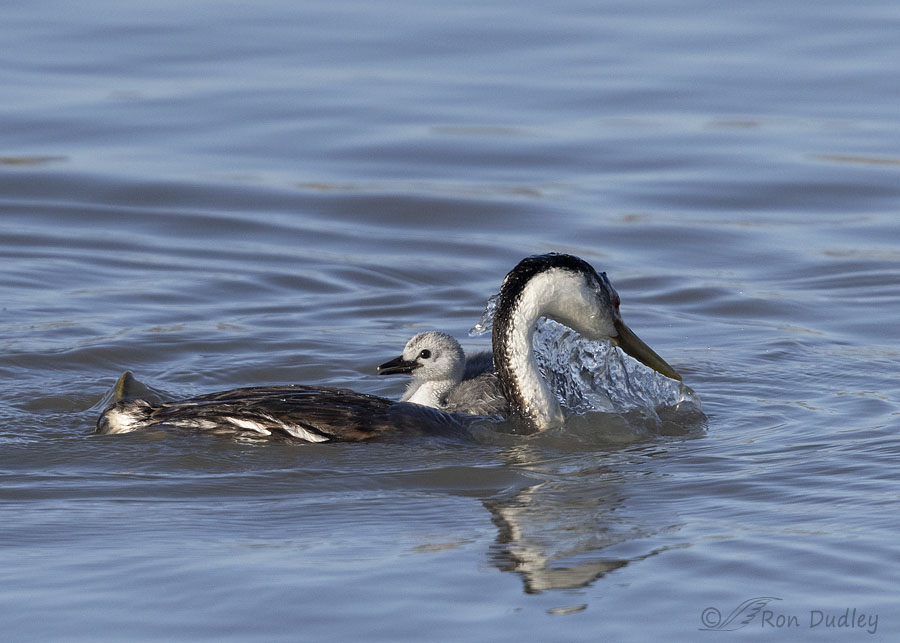
came up empty. Junior doesn’t look happy about it.
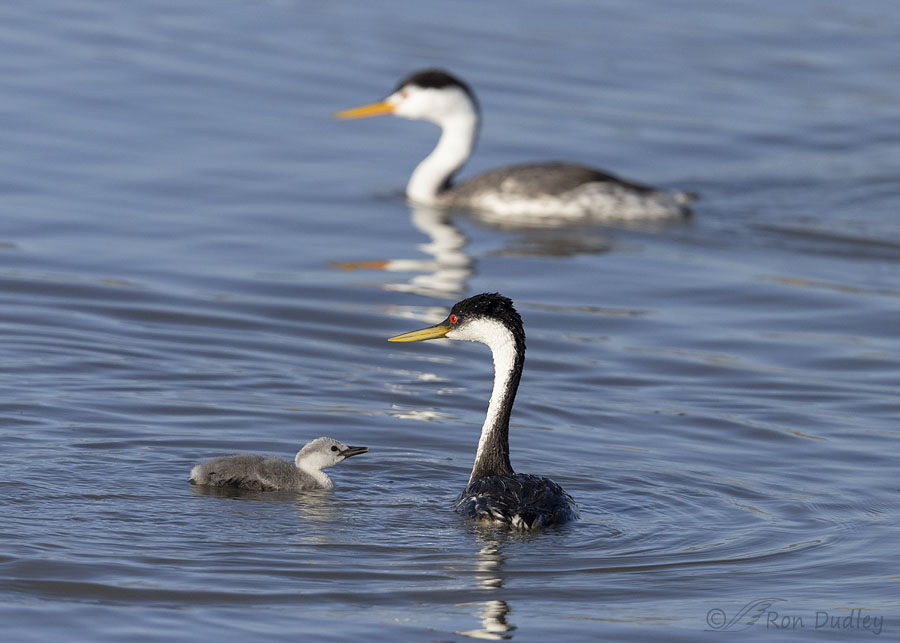
A few seconds later, as a sheepish-looking Dad endured a “where’s my fish?” look from Junior, a Clark’s Grebe swam into the upper frame.
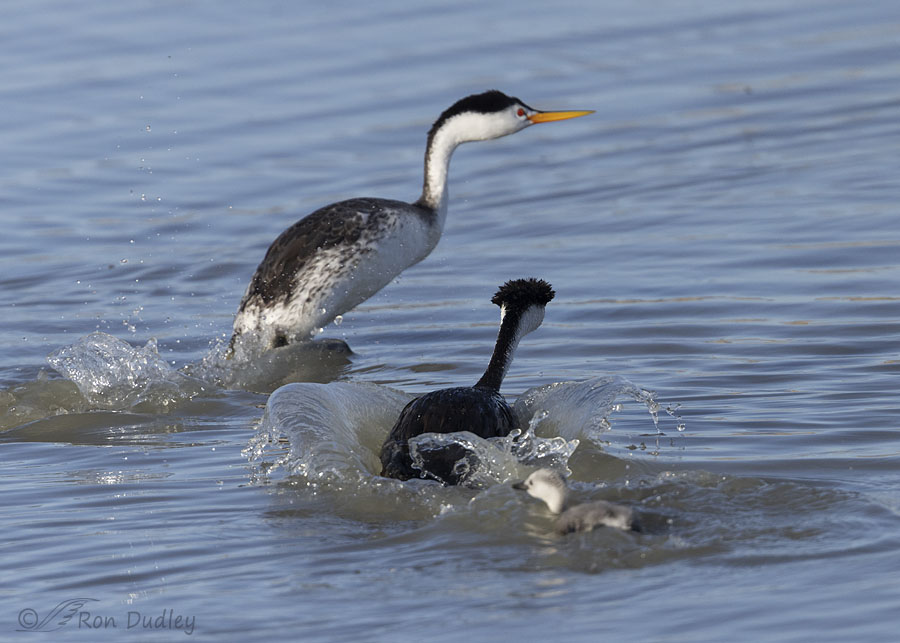
Suddenly all hell broke loose. An opportunistic gull swooped down on the grebes and this was their reaction. The omnipresent thieving gulls don’t miss much and I suspect the gull either saw the grebes lose the fish or saw Dad trying to retrieve it and came in to try to snatch it out of the water.
Note: In this photo it may look like Dad is chasing after the Clark’s Grebe instead of reacting to the gull, possibly because he thought it was getting too close to his chick. But I’m confident that wasn’t the case, for the following reasons:
-
- I actually saw the gull swoop in on them. When this photo was taken the gull was only a few feet above and behind the grebes.
- The Western and Clark’s Grebes on the pond were comfortable with each other’s presence. Grebes of both species, with and without chicks, were intermingling closely with each other with no problems that I noticed.
But this instinctive fleeing reaction from Dad was only fleeting. He appeared to quickly realize that he had a chick to protect so he…
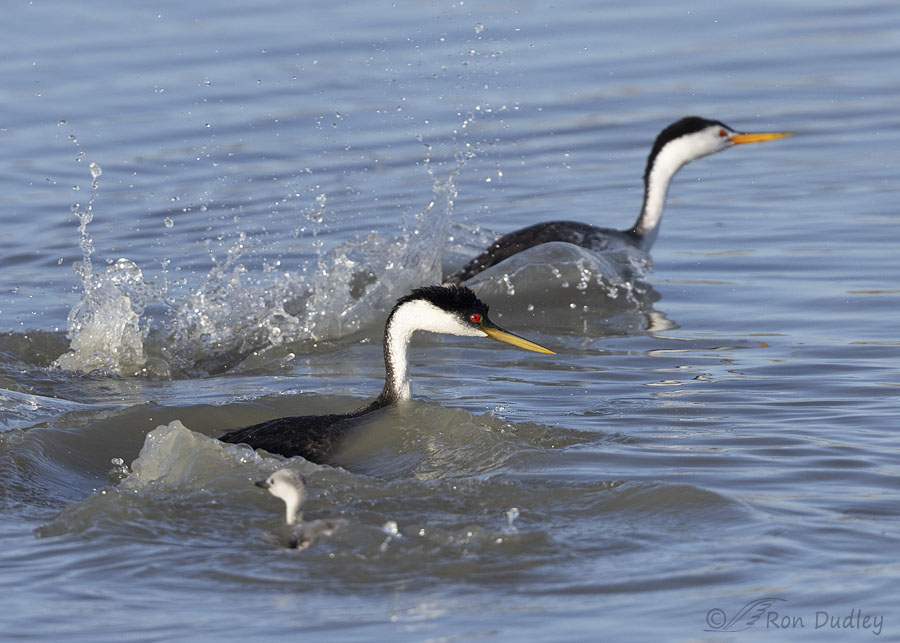
put on the brakes and whirled around to make sure Junior wasn’t being threatened by the gull. Then the gull flew off and everything returned to normal. Including apparently, for the fish.
Obviously, I can’t read the minds of birds so assigning motivations to their behaviors is fraught with peril. But I’m pretty sure that’s what happened, and why.
Ron


I always enjoy your photos and appreciate your observations and descriptions. Thank you for sharing your thoughts and beautiful photographs. I look forward to them everyday.
Thank you, Linda.
Wow. Yet another fascinated series. Considering how enthralled I was with the action ‘on screen’ I suspect I would have been beside myself if I had been there.
Great commentary too.
That fish did look toooo large, but junior obviously didn’t think so.
Thanks, EC. I’ve been wondering if the size of the fish had something to do with them fumbling the handoff.
Too many BIG fish the past few days! Seeing the Stilt yesterday trying to get that giant down made me very nervous – who is gonna do the Heimlich maneuver if it gets stuck? And now dad Grebe trying to give baby a big fish as well? In #5952, Baby seems to be saying to dad “Look at my mouth! It’s only this big! We need a smaller fish that fits into my little mouth!”
Are baby grebes prey for the gull?
Such interesting behaviors. Thanks for the link to the 2013 post, too.
“Are baby grebes prey for the gull?”
Potentially, Carolyn. A friend of mine who’s very experienced with and knowledgeable about birds made this comment on this post on Facebook:
“My guess would be the gull was after the chick. I’ve seen Herring Gulls take Horned Grebe chicks.”
The best photos I’ve seen of food exchanges between adults and young. Thanks.
I suspect the Clark’s Grebe is not paired with the Western. Studies I’ve read suggest interbreeding is known but very rare. The two live together peacefully but have little interaction. There are subtle differences in call and breeding behavior. DNA evidence shows them far apart. At the suggestion of Coues (1880s) and Henshaw (1890s) the two species were eventually combined. But later studies (Storer 1960s?) indicated they bred separately and rarely interacted. With later DNA evidence, the two were eventually considered separate species as was earlier the case. Unfortunately, for many years, when we considered them the same species many people didn’t note any difference, if present. but simply wrote Western Grebe. The few detailed studies that did list them separately still considered them just color phases, not even subspecies. New techniques give us a deeper understanding.
Thanks for providing that background, Dan. What’s your take on this behavior I documented back in 2013?
https://www.featheredphotography.com/blog/2013/07/14/western-grebe-mated-with-clarks-grebe/
Wow. They certainly do behave like a pair. This is not passively ignoring each other (as usually the case) and not aggression (rare) but an interaction that looks like a pair. Most experts consider it rare but since they were considered the same for so long, mixed pairs may simply have not been reported as unusual. I don’t recall details now but I believe that one study suggested some location where this was more likely than other locations. I can’t recall the reasons given for this. I think Bear River was one of the few locations listed.
“I think Bear River was one of the few locations listed.”
I wouldn’t be surprised. And I photographed the grebes in that link at Bear River.
I just reread a study from 2011 (Konter, A. 2011. Interbreeding of Aechmophorus grebes. Wilson Journal of Ornithology 123: 132-136.). This was a large study done in California and Oregon. He estimated that approximately 3.5% of the birds represented hybrids. One location had over 7% hybrids. This study had a large number of birds and he considered that the evidence still warrented keeping the two as separate species.
Thanks for following through, Dan. Interesting stuff.
NIce series.
Thanks, April.
WOW! Action filled indeed! Fish appeared WAY too large for the chick to me. Gulls can be a real PITA in these situations as can Bald Eagles as previously noted. Clarks Grebe remined me of Merganzers when they get going……… 🙂
Definitly some entertainment for you for awhile…..;)
Thanks, Judy. It can be hard to like gulls when you see some of the things they do.
Action packed series. I think it is pretty amazing that they are able to transfer fish from one to another.
“Action packed series.”
They sure kept me busy with my camera for a while.
Another wonderful story. I wonder if the two grebes had mated and junior was the result and one was coming over– they are different species but occasionally do produce young.
It’s possible, Kent. Unlikely but possible. I once photographed a mixed, mated grebe pair. With chicks if I remember correctly.
I think your narrative was pretty accurate Ron. Excellent series. I think that fish was too large for junior to handle even if the hand off had been perfect. In that 3rd photo you can see how large the fish is in comparison to junior’s tiny beak. Pop should have eaten that fish and gone looking for a smaller one for junior.
Gulls are like eagles, they don’t miss very many opportunities to steal a fish.
That’s exactly right about many gulls and Bald Eagles, Everett. Both are inveterate thieves and they’re good at it.
So– the fish was still alive when it was dropped into the water ? If
that was the case, there was even more complication than the Clark’s
and the thieving gull in getting baby fed– I’ m guessing that “breakfast” swam away –or do the grebes have a way of stunning
the fish before feeding them to the babies ?
This has been exactly my question, Kris and Ron. The other day, when a bird was fiddling and fiddling and fiddling with a fish, I “assumed“ that the fish was dead, and I wondered how the bird had killed it. So I guess I have my answer… That the fish isn’t dead. That really does add to the complexity. Thanks for these. Great photos, Ron!
Kris and Ellen, in my experience the fish can still be alive, or dead or stunned. It’s often hard to tell and I don’t know for sure the condition of the fish in this situation.